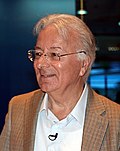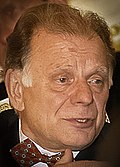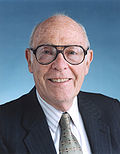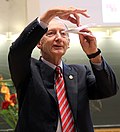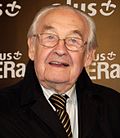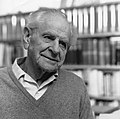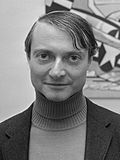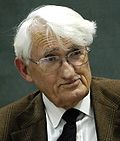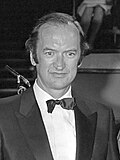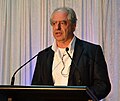Basic sciences
Source: Kyoto Prize
| Year | Laureate | Country | |||
|---|---|---|---|---|---|
| 1985 | 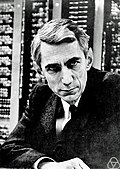 | Claude Elwood Shannon | 1916–2001 | Mathematical sciences | |
| 1986 | George Evelyn Hutchinson | 1903–1991 | Biological sciences | ||
| 1987 |  | Jan Hendrik Oort | 1900–1992 | Earth and planetary sciences, astronomy and astrophysics | |
| 1988 |  | Avram Noam Chomsky | born 1928 | Cognitive science | |
| 1989 | Izrail Moiseevich Gelfand | 1913–2009 | Mathematical sciences | ||
| 1990 |  | Jane Goodall | 1934–2025 | Biological sciences | |
| 1991 | Edward Norton Lorenz | 1917–2008 | Earth and planetary sciences, astronomy and astrophysics | ||
| 1992 |  | Yasutomi Nishizuka | 1932–2004 | Life sciences | |
| 1993 | William Donald Hamilton | 1936–2000 | Biological sciences | ||
| 1994 |  | André Weil | 1906–1998 | Mathematical sciences | |
| 1995 | Chūshirō Hayashi | 1920–2010 | Earth and planetary sciences, astronomy and astrophysics | ||
| 1996 |  | Mario Renato Capecchi | born 1937 | Life sciences | |
| 1997 |  | Daniel Hunt Janzen | born 1939 | Biological sciences | |
| 1998 | 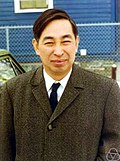 | Kiyoshi Itô | 1915–2008 | Mathematical sciences | |
| 1999 |  | Walter Heinrich Munk | 1917–2019 | Earth and planetary sciences, astronomy and astrophysics | |
| 2000 |  | Walter Jakob Gehring | 1939–2014 | Life sciences | |
| 2001 |  | John Maynard Smith | 1920–2004 | Biological sciences | |
| 2002 |  | Mikhail Gromov | born 1943 | Mathematical sciences | |
| 2003 |  | Eugene Newman Parker | 1927–2022 | Earth and planetary sciences, astronomy and astrophysics | |
| 2004 |  | Alfred G. Knudson | 1922–2016 | Life sciences | |
| 2005 | Simon Asher Levin | born 1941 | Biological sciences | ||
| 2006 |  | Hirotsugu Akaike | 1927–2009 | Mathematical sciences | |
| 2007 |  | Hiroo Kanamori | born 1936 | Earth and planetary sciences, astronomy and astrophysics | |
| 2008 | Anthony James Pawson | 1952–2013 | Life sciences | ||
| 2009 |  | Barbara Rosemary Grant | born 1936 | Biological sciences | |
 | Peter Raymond Grant | born 1936 | |||
| 2010 | 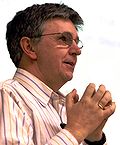 | László Lovász | born 1948 | Mathematical sciences | |
| 2011 |  | Rashid Alievich Sunyaev | born 1943 | Earth and planetary sciences, astronomy and astrophysics | |
| 2012 |  | Yoshinori Ohsumi | born 1945 | Life sciences | |
| 2013 |  | Masatoshi Nei | 1931–2023 | Biological sciences | |
| 2014 |  | Edward Witten | born 1951 | Mathematical sciences | |
| 2015 |  | Michel Mayor | born 1942 | Earth and planetary sciences, astronomy and astrophysics | |
| 2016 |  | Tasuku Honjo | born 1942 | Life sciences | |
| 2017 |  | Graham Farquhar | born 1947 | Biological sciences | |
| 2018 |  | Masaki Kashiwara | born 1947 | Mathematical sciences | |
| 2019 |  | James Gunn | born 1938 | Earth and Planetary Sciences, Astronomy and Astrophysics | |
| 2020 | No award because of COVID-19 pandemic | ||||
| 2021 | 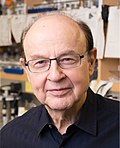 | Robert G. Roeder | born 1942 | Life sciences | |
| 2022 | Bryan Grenfell | born 1954 | Biological sciences | ||
| 2023 | 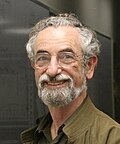 | Elliott H. Lieb | born 1932 | Mathematical sciences | |
| 2024 | Paul F. Hoffman | born 1941 | Earth and Planetary Sciences, Astronomy and Astrophysics | ||








